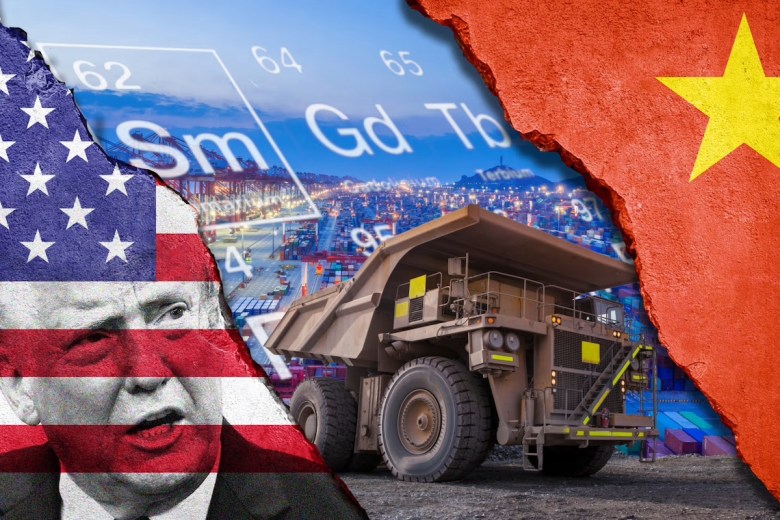Politics
Supply-Chain Tensions Rise as China Leverages Rare Earths

China’s recent actions to leverage its dominance in rare earth minerals are reshaping the landscape of US-China relations, introducing a new level of supply-chain tension. This strategic maneuvering has elevated the stakes in a contest characterized by mutual vulnerability and aggressive policies. As Beijing implements export controls that mimic the United States‘ extraterritorial technology regulations, it has effectively shifted the battleground upstream. A few critical chemical processes now hold significant power over entire industries, demonstrating how intertwined both economies have become.
The implications of this situation extend beyond mere trade disputes. With Washington attempting to regulate microchips globally, China is responding by exerting influence over the raw materials critical to various sectors, from electric vehicle (EV) production to advanced munitions. This development reveals a striking symmetry: US restrictions prevent Chinese firms from accessing cutting-edge technology, while China controls essential inputs necessary for production in those very technologies.
The reality is that China’s advantage lies not merely in the physical resources but in decades of investment in areas like separation chemistry and magnet manufacturing. These assets are not easily replicated, even with state-backed subsidies. As tensions rise, both nations are navigating a complex political landscape. The US is escalating its approach with entity lists and tariff threats, while China alternates between nationalist rhetoric and conciliatory messaging, aiming to display strength while leaving room for negotiations.
Despite both countries’ discussions about resilience, they are confronting underlying fragility. China remains heavily reliant on exports and is grappling with economic challenges, including deflationary pressures and struggles within its property sector. The United States, on the other hand, is facing multi-year timelines to establish competitive mining and processing capacities. The intricacies of modern manufacturing reveal that exposure to these supply chains is systemic. Industries reliant on high-performance magnets, including EVs, wind turbines, and defense platforms, are predominantly dependent on materials processed in China.
The concept of a painless decoupling underestimates the complexity of the co-specialization that has developed over the past three decades. This “weaponized interdependence” not only impacts the targeted nation but also backfires on the aggressor, compelling businesses and governments to diversify their sources away from both powers.
To navigate these challenges effectively, several recommendations emerge. First, a realistic approach to timeframes and sequencing is essential. The development of mining and magnet production in the US will take considerable time, often measured in election cycles. While stockpiles and defense contracts may provide temporary relief, without long-term commercial agreements, private investment in full-scale facilities is unlikely to materialize at the pace promised by politicians.
In the interim, establishing a practical truce for civilian trade is crucial. A focused agreement on “minerals-for-chips” that is reciprocal and transparent could facilitate smoother flows of essential goods such as automotive parts, consumer electronics, and medical devices. This arrangement would require a mechanism for swift retraction if either side breaches the terms, alongside a standardized “material passport” to simplify customs processes and diminish the risk of licensing becoming a means of data collection.
Building real backups is another vital step. Encouraging transparent and sustainable mining operations outside both the US and China can help mitigate concentration risks. Forming multinational licensing consortia that incorporate effective dispute resolution could also streamline approvals. Additionally, coordinated third-party reserves would create buffers against political volatility.
The role of Asian nations is particularly significant in this context. Countries like Japan, South Korea, and others in Southeast Asia are integral to global supply chains, particularly in sectors such as automotive manufacturing and electronics. An Asia-based “escrow lane” could facilitate the movement of essential civilian shipments during periods of political tension, managed by a neutral party with specific allowances for critical sectors.
While some skeptics may dismiss the situation as a blame game—China accusing the US of acting as a global enforcer, and Washington denouncing China’s power grabs—this finger-pointing does not address the pressing need for practical solutions. Tightening controls without investing in alternatives will lead to a “volatility tax” on essential goods, impacting consumers and businesses alike.
The recent developments surrounding China’s rare-earth policies underscore the urgent need to rethink “economic security.” The lesson is clear: weaponizing supply chains inflicts damage on both sides and can have broader economic repercussions. A more constructive approach would be to maintain stable civilian trade while gradually building non-Chinese capacity. Establishing clear rules for licensing can help manage risks effectively, ensuring that interdependence serves the interests of people rather than escalating into crises that no one can afford to win.
This nuanced perspective is articulated by Tony Yang, an Endowed Professor at the George Washington University, who emphasizes the importance of pragmatic solutions in navigating the complexities of contemporary global trade dynamics.
-

 Business5 months ago
Business5 months agoKenvue Dismisses CEO Thibaut Mongon as Strategic Review Advances
-

 Lifestyle4 months ago
Lifestyle4 months agoHumanism Camp Engages 250 Youths in Summer Fest 2025
-

 Sports4 months ago
Sports4 months agoDe Minaur Triumphs at Washington Open After Thrilling Comeback
-

 Sports5 months ago
Sports5 months agoTupou and Daugunu Join First Nations Squad for Lions Clash
-

 Top Stories5 months ago
Top Stories5 months agoColombian Senator Miguel Uribe Shows Signs of Recovery After Attack
-

 World5 months ago
World5 months agoASEAN Gears Up for Historic Joint Meeting of Foreign and Economic Ministers
-

 Health4 months ago
Health4 months agoNew Study Challenges Assumptions About Aging and Inflammation
-

 Business5 months ago
Business5 months agoOil Prices Surge Following New EU Sanctions on Russia
-

 Entertainment4 months ago
Entertainment4 months agoDetaşe-Sabah Violin Ensemble Captivates at Gabala Music Festival
-

 Entertainment4 months ago
Entertainment4 months agoBaku Metro Extends Hours for Justin Timberlake Concert
-

 Top Stories5 months ago
Top Stories5 months agoRethinking Singapore’s F&B Regulations Amid Business Closures
-

 Business5 months ago
Business5 months agoU.S. House Approves Stablecoin Bill, Sends to Trump for Signature









